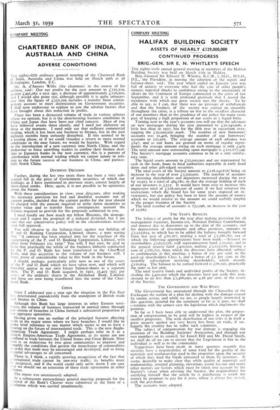COMPANY MEETING
HALIFAX BUILDING SOCIETY
ASSETS OF NEARLY £129,000,000 CONTINUED PROGRESS BRIG.-GEN. SIR E. N. WHITLEY'S SPEECH
THE eighty-sixth annual general meeting of members of the Halifax Building Society was held on March 27th in Halifax.
Brig.-General Sir Edward N. Whitley, K.C.B., C.M.G., D.S.O., D.L., the President, in moving the adoption of the report and balance-sheet, said: The year which ended on January 31st was full of anxiety to everyone who had the care of other people's money; repeated shocks to confidence owing to the uncertainty of affairs on the Continent of Europe culminated in the crisis of last September, and it is with profound gratitude that I record the steadiness with which our great society met the shocks. To be able to say, as I can, that there was no pressure of withdrawals and that the business of the society was carried on smoothly throughout the crisis, is a tribute no less to the steadfast character of our members than to the prudence of our policy for many years past of keeping a high proportion of our assets in a liquid form.
Turning now to the year's accounts you will see that the advances on new mortgages during the year amounted to £20,340,996, a little less than in 1937, but for the fifth year in succession over- topping the £2o,000,000 mark. The number of new borrowers' accounts was 31,406, bringing the number of our borrowers' accounts to 250,916. The average amount of each advance was £647, and as our loans are granted on terms of regular repay- ments the average amount owing on each mortgage is only £419. The total amount now outstanding upon mortgages is £105,177,549. The Society's mortgage accounts continue to be in a very satisfac- tory state.
The liquid assets amount to £22,000,000 and are represented by cash in the bank, loans to local authorities repayable at early fixed dates and other gilt-edged securities. The total assets of the Society amount to £128,242,856,-being an increase in the year of over £5,500,000. The number of accounts of investing shareholders and depositors increased during the year by 10,913 to a total of 484,180, so that the average holding of each of our investors is £252. It would have been easy to increase this impressive total of £128,000,000 of assets if we had removed the restrictions which the board has for some years imposed on in- vestments, but our policy has been to limit the amount of money which we would receive to the amount we could usefully employ in the proper business of the Society
The total number of accounts is 735,096, an increase in the year of 22,682.
THE YEAR'S RESULTS
The balance of profit for the year after making provision for all management expenses, Income-tax, National Defence Contribution, and interest due to depositors up to the date of the accounts, and for depreciation of investments and office premises, amounts to £3,222,614, to which has to be added the balance brought forward from last year of £66,167, making a total of £3,288,782, out of Which the following appropriations have been made: —Interest to shareholders £2,652,076, staff superannuation fund £50,000, and to the general reserve fund £40o,000, making £3,102,076, leaving a sum of £186,705, from which the directors have allocated, subject to confirmation at this meeting, a bonus of los. per cent. to the paid-up shareholders Class 1, and a bonus of £1 per cent. to the monthly subscription investing shareholders, which absorbs £120,614. The balance to be carried forward is £66,090, practically the same as last year. The total reserve funds and undivided profits of the Society, in- cluding the £400,000 which the directors have put aside this year, amount to no less than £5,466,090, or 4.26 per cent. of the assets of the Society.
THE GOVERNMENT AND WAR RISKS
The Government has announced through the Chancellor of the Exchequer the outline of a plan for dealing with the damage caused by enemy action, and while we are, as people largely interested in this question, grateful for the statement so far as it goes, we shall scrutinise with the utmost care the legislation which implements the promise. So far as I have been able to understand the plan, the propor- tion of compensation to be paid will be highest in respect of the smallest properties. The wide distribution of our risks is in itself a great security against any very heavy loss from air raids, if un- happily the country has to suffer such calamities. The subject of compensation for war damage is engaging the attention of the Building Societies' Association, and through our two members on its council, Sir Enoch Hill and Mr. David Smith, we shall do all we can to ensure that the Legislature is fair to the individual as well as to the community.
Suggestions have been made in some quarters recently that • societies have a responsibility of some kind for the quality of the materials and workmanship used in the properties upon the security of which they lend the funds entrusted to them by investors. It seems desirable to make clear that while quality of materials and workmanship, internal planning, elevations, estate lay-out and many other matters are factors which must be taken into account by the Society's valuer when advising the Society, the responsibility for satisfying himself that the article he is purchasing is worth the money he proposes to pay for it rests, where it always has rested, with the purchaser. The accounts were adopted.


































































 Previous page
Previous page